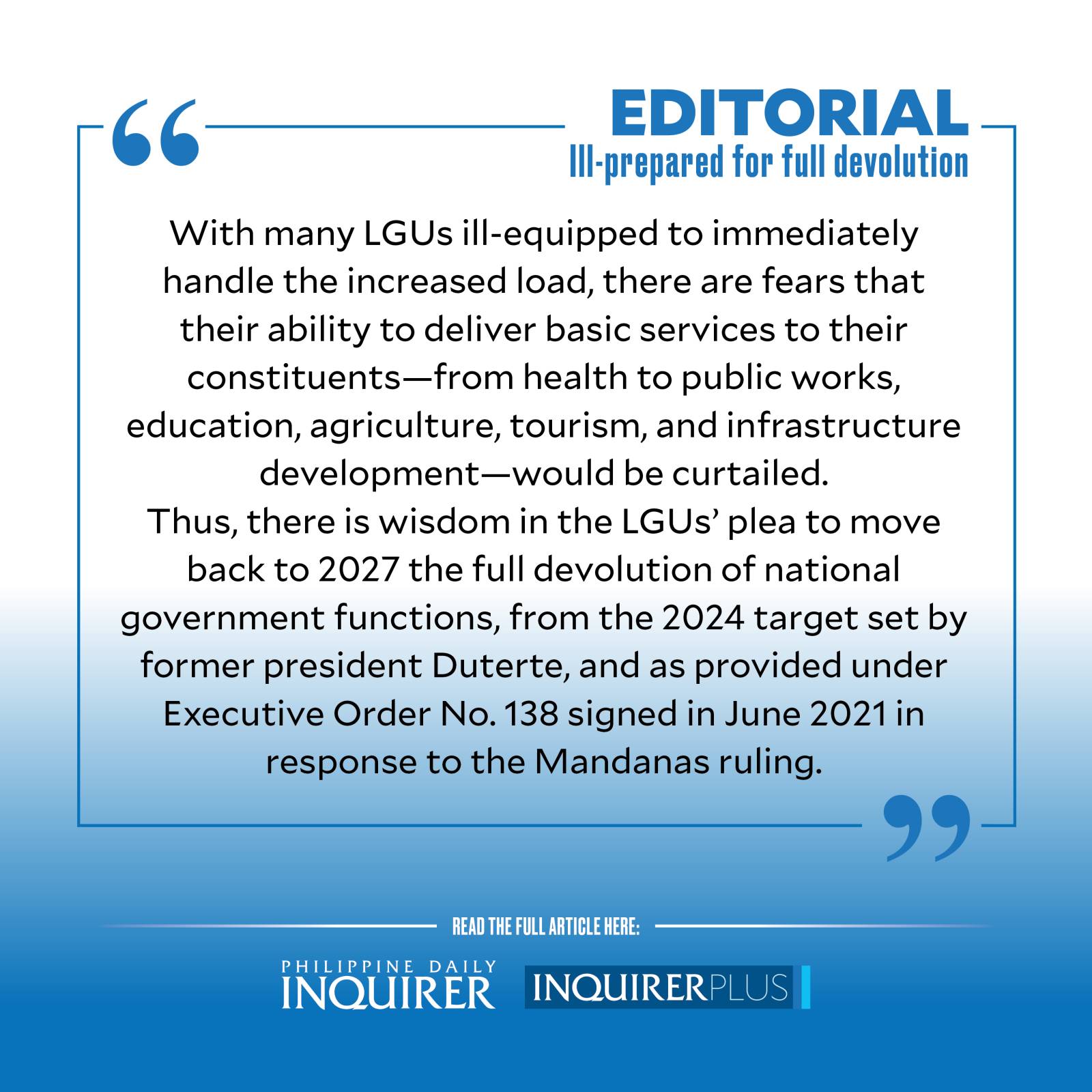Ill-prepared for full devolution

Local government units (LGUs) finally got the increased allotment they had long been fighting for under the landmark Mandanas-Garcia ruling that entitled them to a bigger share of total government revenues.
But are LGUs ready for the far heavier responsibilities that come with the higher allotment? Apparently not.
“Based on our interactions with LGUs across the country, many are clearly not ready for full devolution. The risk of failure is high,” warned Jonathan Malaya, executive director of the think tank Local Government Development Institute (LGDI), and former undersecretary of the Department of the Interior and Local Government.
With many LGUs ill-equipped to immediately handle the increased load, there are fears that their ability to deliver basic services to their constituents—from health to public works, education, agriculture, tourism, and infrastructure development—would be curtailed.
Thus, there is wisdom in the LGUs’ plea to move back to 2027 the full devolution of national government functions, from the 2024 target set by former president Duterte, and as provided under Executive Order No. 138 signed in June 2021 in response to the Mandanas ruling.
World Bank estimates in 2021 showed that the Mandanas ruling would increase the internal revenue allotments of LGUs by 55 percent in the 2022 budget, hitting P1.08 trillion or 4.8 percent of the country’s gross domestic product, compared to 3.5 percent in 2021.
“However, some local governments have started to raise concerns regarding their financial and technical capacity to absorb redevolved mandates,” said the World Bank, “Underspending by local governments may worsen, as many [LGUs] do not have the capacity to absorb a significant increase in revenues.”
A 2021 paper by the Congressional Policy and Budget Research Department of the House of Representatives had the same conclusion, noting that without enough time to bolster LGUs’ capabilities to absorb the increased revenues and devolved functions, the “levels and quality of service delivery across LGUs could vary greatly especially on account of fiscal disparities and lack of capacity (both institutional and for human resources).”
Given this, Malaya said it was “critical” that LGUs are actually prepared technically and financially to take on the additional functions that come with full devolution, or the transfer to mayors and governors of the task to implement programs and projects currently being done by national government agencies.
“If the LGUs are not ready to deliver the services given before by the national government, it may result in delayed or deficient implementation which is to the detriment of public service,” Malaya said.
The inadequacies bared are not just in terms of competent personnel, but also in systems and processes to deploy the programs devolved from the national government, as well as the controls and accountability mechanisms, to ensure that taxpayer money does not go to waste or is lost to corruption.
Malaya said the government should recall the lessons learned from 30 years of devolution, starting from the passage in 1991 of the Local Government Code that had “mixed results of successes and challenges,” as underscored in that 2021 paper by the House’s policy and budget research department.
Given the deficiencies, the LGDI said it would be more prudent to extend the transition period to six years, or up to 2027, to improve the LGUs’ procurement processes to enable them to immediately deploy their budgets and implement the needed programs, without sacrificing the delivery of public services. But these capacity-building initiatives must be done in earnest by the LGUs and with a set timeline so as not to indefinitely delay the implementation of the ruling.
Clearly, there are more than a few kinks to iron out, and it is heartening that the Committee on Devolution, chaired by the Department of Budget and Management, is closely looking at the devolution process and the significant challenges that now confront both national and local governments, well aware that the implications of the ruling go far beyond just funneling more money to LGUs.
The possibility of amending EO 138 to extend or revise the devolution timeline has been raised as well. As stressed by Budget Secretary and committee chair Amenah F. Pangandaman, effective devolution will be achieved only if LGUs, which have the potential to improve the lives of people and communities through better delivery of social services, are fully prepared, both technically and financially, and not anytime earlier than that.




















